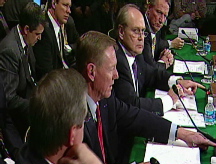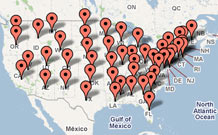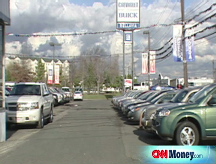Big Three plead for $34B from Congress
The CEOs of GM, Ford and Chrysler are back on Capitol Hill asking for loans and trying to undo damage they did during the previous auto bailout hearings.

NEW YORK (CNNMoney.com) -- The CEOs of the leading automakers were back before Congress Thursday, arguing for a larger bailout than they asked for just two weeks ago, and hoping to undo the damage they did to their case at the earlier hearings.
The executives of General Motors, Ford Motor and Chrysler LLC generally faced less hostility from members of the Senate Banking Committee than they did at their last hearing two weeks ago.
But they still heard a lot of tough questions from members of the Senate Banking Committee, and the bailout push clearly faces an uphill battle for approval, even though it is now more urgent for the automakers to get help.
"All of us up here appreciate that inaction is not an option," said Sen. Christopher Dodd, D-Conn, the chairman of the committee, at the end of nearly six- hour long hearing. "We're also not about to write a check and just hand it over."
Dodd said members would work with House and Senate leadership in the next few days to try to get a vote. He also voiced hope that either the Treasury Department or Federal Reserve would provide stopgap funding to the Big Three.
But so far, the Bush administration has opposed Treasury becoming involved. Dodd said the Fed had not responded to a letter he sent seeking help from the central bank. The Wall Street Journal reported Thursday that it was unlikely the Fed would give any financial aid to the automakers.
The three automakers are now asking for up to $34 billion in federal loans, up from their earlier request for $25 billion in assistance. Two of them, GM (GM, Fortune 500) and Chrysler LLC, are warning they could run out of the money they need to operate before the end of the year without immediate help.
This time GM CEO Rick Wagoner, Ford (F, Fortune 500) CEO Alan Mulally and Chrysler CEO Robert Nardelli drove fuel-efficient hybrids to Washington, rather than flying in on corporate jets as they did two weeks ago.
Ford and GM have since announced they would sell their jets. And all three CEOs have agreed to cut their pay to $1 a year if they get the federal help they are seeking.
After presenting plans to Congress Tuesday that detailed how they would use loans to return to profitability, each company warned of tremendous damage to the economy if they are forced to file for bankruptcy due to lack of help.
In prepared testimony Thursday, Mulally quoted an estimate from Goldman Sachs that said the impact to the economy from failures could be up to $1 trillion.
Several members of the committee, particularly Republicans, challenged the assertions of the auto executives, however.
"I've read the plans and re-read the plans," said Sen. Bob Corker, R-Tenn. "I still believe there are many things that will be difficult to work out without chapter 11 [bankruptcy]."
Sen. Mike Crapo, R-Idaho, suggested that if federal loans are approved, a federal oversight board should be given the same kind of powers as a bankruptcy judge to impose changes in contracts and debt holders. None of the automakers said they would be opposed to this.
But getting approval for the loans may still be a tough sell. Even the Democratic leaders of the House and Senate who are in favor of help for the automakers have refused to commit to calling the outgoing members of Congress back next week to vote on an auto bailout.
Congressional leaders are concerned that public opinion has turned strongly against help for the automakers.
Protesters briefly disrupted the hearing Thursday, chanting "the bailout is a sell-out!" and urging Congress to use money to help the poor and food banks, rather than the auto companies.
A CNN/Opinion Research Corp. poll of nearly 1,100 Americans conducted earlier this week found 61% oppose a bailout, while only 36% support it. Even in the Midwest, home to most of the automakers' remaining plants, 53% of those polled opposed federal help.
That was a stunning reversal of polls taken before the CEOs last trip to Capitol Hill. A poll Nov. 11 and 12 conducted by Peter D. Hart Research Associates found 55% supported federal assistance for automakers at that time, and only 30% who believed they should not get federal help.
Corker called GM's plan "a nice first step" but he said that the company's debt levels are unsustainable at any level of sales. He also argued Chrysler is just trying to get the loan to stay in business long enough to be bought by another automaker.
"There is no sane person who thinks that all three companies can survive," Corker said.
Nardelli challenged that assertion, saying Chrysler would be able to stay independent if it gets the loan. He said the company's discussion in its turnaround plan of benefiting from further consolidation could include alliances instead of an outright merger.
GM and Chrysler were in merger talks earlier this year but GM said last month that it ended discussions with Chrysler because of the need to deal with its own cash crisis. But both Nardelli and Wagoner said Thursday they wouldn't rule out a merger in the future, even though they were not looking to do such a deal at this time.
In his prepared remarks, GM's Wagoner acknowledged the criticism of him and his fellow Big Three executives.
"It's fair to say that last month's hearings were difficult for us, but we learned a lot," he said. He said the companies revised their plans since then and accelerated their cost-cutting efforts.
"We're here today because we made mistakes, which we're learning from; because forces beyond our control have pushed us to the brink," Wagoner said. "Most importantly we're here because saving General Motors, and all this company represents, is a job worth doing."
United Auto Workers union President Ron Gettelfinger joined the CEOs in asking for help. He pointed to concessions that the union agreed to in the 2007 labor contract as well his promise made Wednesday that the UAW would work to give the automakers additional concessions. But he said the burden of saving the automakers shouldn't fall on the union and its members alone.
"If the federal government can provide a blank check to Wall Street, it should be able to provide a temporary bridge loan to General Motors, Ford and Chrysler," he said.
Nardelli stressed that one reason it's important to help the Big Three is because the companies are making great strides in hybrid and electric vehicle technology.
He argued that keeping the U.S. automakers afloat "would insure that we don't trade our dependence on foreign oil to a dependence on foreign technology."
But Sen. Richard Shelby, R-Ala., the ranking Republican on the committee, repeated his earlier opposition to helping the Detroit automakers.
He said the increase in the money being requested by the Big Three is a sign that the automakers can't give good assurances that federal loans would be enough to solve the problems facing the industry.
"If you made this presentation to get a bank loan, I suspect any sensible banker would systematically reject your request," said Shelby.
Mark Zandi, chief economist of Moody's Economy.com, joined the CEOs in urging passage of the loan package. He said the economy is too vulnerable at this moment to weather the damage that would be caused by a failure of one or more of the companies.
But Zandi cautioned that car sales are likely to stay very low due to rising job losses, tight credit as well as an unsustainable level of sales from earlier in the decade. He cautioned that an auto turnaround could eventually cost between $75 billion and $125 billion.
"The automakers have come forth with a reasonable plan to restructure their business, but the $34 billion might not be enough for them to become viable again," he said.
Zandi said he would expect the automakers to be back before Congress late in 2009 for additional money.
But he said that even if the Big Three were to get $125 billion in loans and default on them, that would be cheaper for the federal government than the cost that automaker bankruptcies would cause since a failure could lead to lost tax revenue, increased Medicaid and unemployment payments.
"It's not a close call," he said about the cost of a bankruptcy. "It's not even in the same universe. A bankruptcy at this point in time would cataclysmic for the economy."
In his opening comments, Dodd spoke forcefully for some kind of assistance for the auto industry. He said that allowing the automakers to go bankrupt would be the equivalent of playing "Russian roulette with the economy."
Dodd added that despite mistakes made by the automakers, GM, Ford and Chrysler had all done more than banks and Wall Street firms to show they deserve federal help. ![]()




